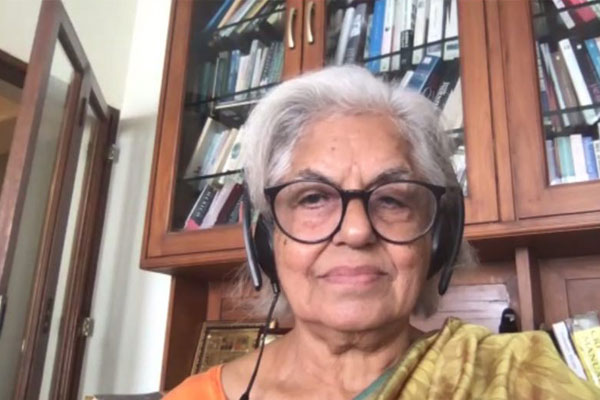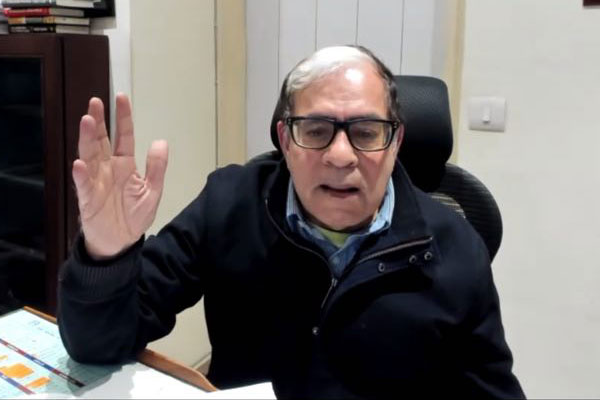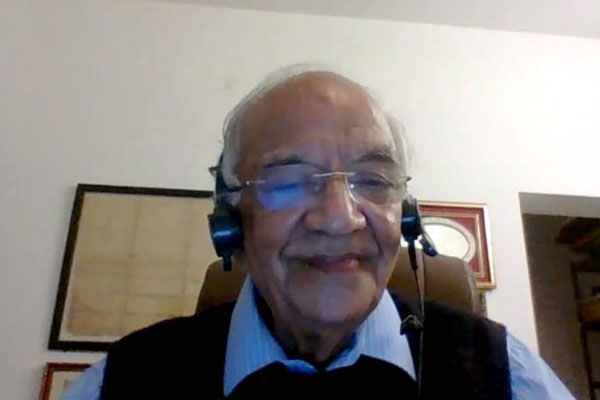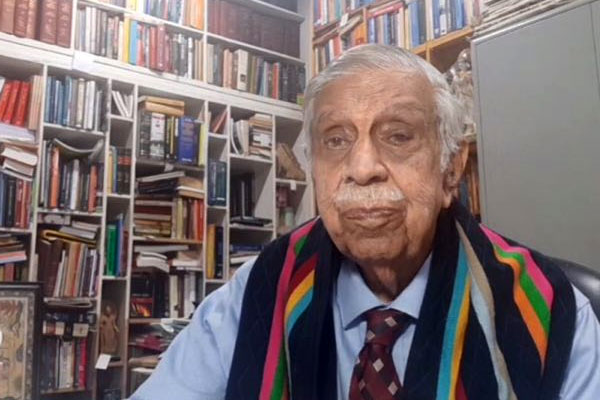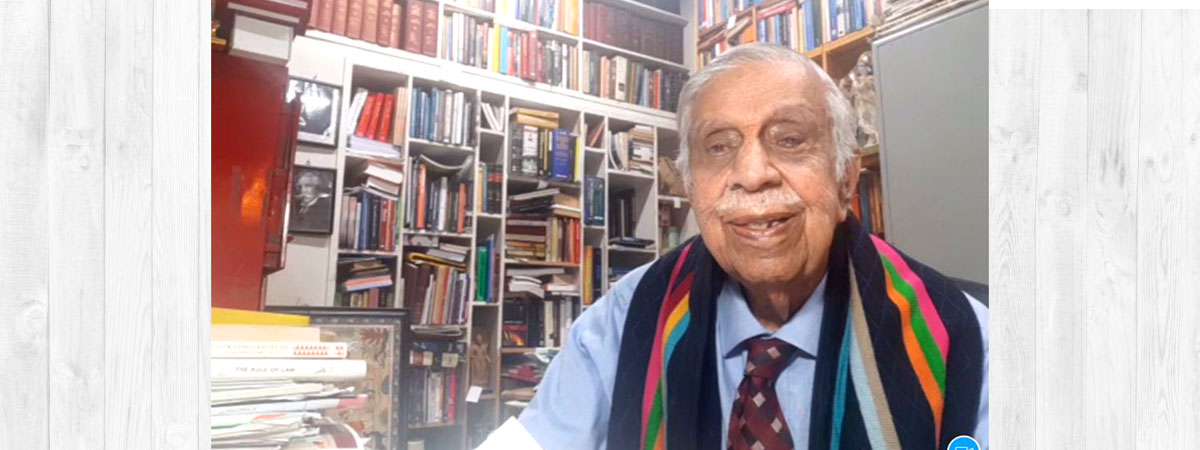
"Pendency is a serious problem plaguing our judicial system. Indian judiciary needs to adopt new tools and technology that will speed up the process and mitigate delays. Technology, like artificial intelligence (AI), can help the judiciary in a big way and with this Indian courts would be able to dispose of almost 90% of the pending cases in just 18 months,” former Chief Justice of India MN Venkatachaliah said on Saturday. He was delivering the 3rd Annual RTI Lecture organised by Moneylife Foundation’s RTI Centre online.
He says, “The AI scanner can read some four-lakh pages in about three to four minutes. But the language platform must be compatible with the material available in courts. Only then the advantage of AI solutions will accrue. AI has some limits but it can be done.”
According to Justice Venkatachaliah it is a weak society that appeals to judicial paternalism to solve its problems. "The protection of democratic values is the conscience of civil society and should control the political society. If the civil society itself is fractured and fragmented, and consists of groups in perpetual conflict with each other, then the political society will have ample opportunity to manipulate the groups and set off one against the other," he says adding, "With the same token, a representative democracy has to approximate closely to the society it seeks to represent in order to maintain its legitimacy as a system of government."
Justice Venkatachaliah pointed out that there is perceptible democratic fatigue all over the world. "I call it a democratic fatigue. Various surveys around the world show considerable increase in calls for a strong leader, who does not have to bother with parliament and elections, and that trust in governments and political parties is at a historical low. This is the pendulum effect, as they call it. If you go to the other end, you think the next opposite end is heaven. This is how the public mind is and trust in governments and political parties is at a historical low. It appears that people like the idea of democracy but not the reality. They love the idea, but not the result."
"But imagine in 2014 elections, if I remember right, in the general elections Bahujan Samaj Party (BSP) got the third largest vote share in the country but they did not win even one seat.
"Parties with a much lower vote share won a number of seats in parliament. This is an anomaly, which is inherent in the system," he added.
On judicial activism, the learned judge says, "Judicial activism can at times run against the doctrine of judicial restraint,” adding “Many judicial interventions may not present judicially manageable standards, and lack adjudicative disposition. They may answer an absent human need, but a faint crack develops in the foundations of our system of government. A judge begins to rule where only a legislator can. It is only a weak society that constantly appeals to judicial paternalism to solve its problems. Such a weak society loses the excitement of democracy to fight issues out democratically.”
"Judicial activism can be a slippery slope. Generally, policy issues are a difficult area for future penetration. Courts have recognized the limitations on their power of judicial law making or in the absence of judicially manageable standards or on the grounds of political tickets," Justice Venkatachaliah says.
Over the years, the Indian Judiciary has promoted the egalitarian thought enshrined in the constitution, to protect individual liberty and the philosophy of legal control of the government.
"Parliament can make the law, but are there any ethical rules in law making? Written constitutions are made to realise this aspiration, they seek to avoid the concentration of power by built in checks and balances and constitute the foundation of the legal system. This is the sentinel of the qui vive," he says.
Explaining the constitutional philosophy of checks & balances that Chief Justice Patanjali Sastri enunciated when he referred to the court as a “sentinel on the Qui Vive” in the famous VG Row case of 1952, Justice Venkatachaliah said, the “structure of government should be so designed that each branch is a sentinel on the qui vive against the other two, lest they become too powerful or too autocratic. No constitution works by itself. It needs the instruments of the common law, legislation and constitutional convention. That is a very, very important thing."
In his thought-provoking lecture, the 92-year-old Justice Venkatachaliah, who is often called the 'Bhishma Pitamah of Indian Judiciary', touched upon the importance of judiciary and the role played by institutions in an active and thriving democracy.
He says, "Rights and ownership of property became an obstacle for reform and social progress, illustrating how sacrifice of the social good at the altar of rule of law makes the law itself barren and hollow. Rule of law is only a means to an end, not an ending itself."
The web talk was attended by several prominent personalities from all fields and included concerned citizens, and leading RTI activists from across the country.
According to the former chief justice, to aid the Constitution's vision of a new egalitarian order and shape the architecture of an inclusive society, the role of the constitutional courts came to the forefront. He then explained three important concepts that strengthen relations between the judiciary, other institutions and the common citizens.
He says, "Traditional threshold limitations and the entry to the courtroom had to be relaxed. We call it the locus standi. If a person did not have a direct personal interest in the subject matter of the litigation, he would be seen as a mere meddlesome interloper or a busybody. But the poor and the marginalised, whose interests were affected had no educational or financial means to access justice by themselves. Therefore, the threshold bar or locus standi had to be relaxed. That was done by a great act of judicial sportsmanship."
"The second equally important transformation was of the role of the judge himself. He can no longer be a mere umpire. He assumed the conceptual role of one who, quoting Professor Upendra Baxi, formally anchors adjudicative leadership of the nation as an integral judicial duty towards the people of India and reinstall the concept of judicial power as an aspect of judicial duty. This is the most important transformation of the role perception of the judge in public law."
"Thirdly, the court had to fashion new tools for legal control of government. Every action of the government had to have a legal pedigree. Courts successfully enlarged the concept of stay, to include its instrumentalities and agencies, developing new legal algorithms for holding them down to the duties and responsibilities towards the people - protect and promote democracy and democratic values, protect environment, protect such vulnerable sections as women, children, and prisoners under trials. Courts also need to develop principles guiding the liability of those who store and use intrinsically dangerous substances such as poisonous gas and develop absolute and not mere strict level principles," Justice Venkatachaliah says.
The lecture of Justice Venkatachaliah (retd) was followed by a panel discussion. The panellists included Chief Justice Venkatachaliah, Supreme Court Justice AK Sikri (retd) and Senior Counsel Indira Jaising. It was presided over by former Chief Election Commissioner TS Krishnamurthy, who is also a trustee of Moneylife Foundation.
Participating in the discussion, Justice Sikri noted that starting from a conservative role, post the emergency and the 'black spot' of the ADM Jabalpur case, there was a 'total transformation in the judiciary' and the advent of transformative constitutionalism and judicial activism.
"Of late some issues have been raised over the judiciary's functioning, including whether it is selective, whether exercise of contempt powers is justified, role of CJI as master of roster, and whether it is being a procrastinating institution," he says, while musing if this was due to the expanding role of the courts, public interest litigations (PILs) jurisdiction, activism - although it has done wonders for public welfare.
However, he observed "the expectation of society has also gone high."
"Judiciary cannot act as a catalyst. Change in society has to come from other sources. The question is what kind of role judiciary should play?" Justice Sikri asked.
He also spoke about governance and constitution. Today, he says, "it is not a person - it is the Constitution which is the instrument of governance and it is the Constitution which is supreme. Power should not be with one. So, it rests on three pillars - the legislature, the executive, the judiciary. They work in tandem, but their roles are assigned and they act as checks and balances on each other also."
Justice Sikri touched upon democracy and limited government. He says, "Any government acting in consonance with the Constitution cannot take away the fundamental rights of the individuals. It is based on the liberty of individuals which is to be respected. If there is some effort to topple the democracy, that is where the role of the judiciary comes in. Judiciary's role is to protect rule of law. Any onslaught on the Constitution or the freedom of the people, the judiciary has to step in."
"On the whole, the judiciary has been able to play the role over time as a sentinel on the qui vive. But some introspection is needed on how to go forward," Justice Sikri added.
Advocate Jaising, who is a Founder of Lawyer's Collective and the first woman Additional Solicitor General of India, spoke about the structure of the bar and the appointment of judges and how it had changed over the decades, since the pool of talent that finally comprises the bench is key to our expectation from the judiciary.
She also explained her idea of an ideological court, while raising questions on recent court decisions. “Does living under a majoritarian regime have a chilling effect on the judiciary? Do they succumb to 'the will of the people' as represented by the government of the day?” she asked.
The senior counsel says, “From the decision in Babri Masjid to the decision to put in colds storage the challenge to the Citizenship (Amendment) Act (CAA), electoral bonds, the challenge to the abolition of Article 370. From the grant of bail to some journalists but not to others, we see the evidence of a self-conscious court. But perhaps this is a charitable description. What we really have is more than one Supreme Court in the Court and sometimes more than one judge in one judge. It has become a ‘pick and choose’ court, where power of the master of the Roster is Supreme over all else.”
“We are nowhere near a post-Covid world. Not surprisingly, the pandemic has made the rich richer and the poor poorer. Our challenges are many, already the right to food security is under threat by the supply chain being monopolised by big business and the dismantling of the minimum support price (MSP) and the dismantling of the Essential Commodities Act (ECA). More and more the judiciary will have to handle these issues in court and unless they are equipped with the philosophical tools to deal with equal justice, the Court will fail in its role as the sentinel on the qui vive,” she added.
The panellist also answered several questions asked by the participants.


